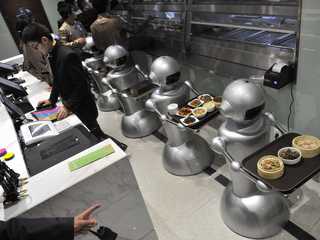
There has been a lot of concern recently that millions of jobs are due to be automated out of existence over the coming decades. Of course, this is nothing new.
Since the Luddites undertook the very first acts of machine breaking, capitalism has sought to replace living labour – workers, by hand or by brain – by what Karl Marx called dead labour, or machines. And this has been the pattern of economic development since the end of the 18th century.
We can see this in an accelerated form in Britain over the course of the last 40 years, through the disappearance of manufacturing jobs either by exporting them to low wage zones in the developing world or via obsolescence through technology.
The next wave of automation, however, promises to be deeper and more thoroughgoing. The service sector jobs, the white collar office jobs that grew as manufacturing disappeared, are those set to be replaced by self-service kiosks, software, algorithms and, in a few cases, robots.
What is the future for work?
This has been a concern of social theorists Michael Hardt and Antonio Negri. They have argued occupations that place people and the production of social relationships at their heart are the emerging and increasingly dominant forms of work.
The shift in labour markets these last 40 years typify what they call the ‘social worker’, or what we might understand now as the networked worker. Examples run across the occupational and status scale – human resources/managers, shop assistants, couriers, drivers, marketing, trainers and personal services providers, coffee shops, lawyers. Advances in robotics, software and artificial intelligence all variously threaten them. The common pattern is one where tasks are amenable to automation.
For instance:
* Accountancy software requiring a few inputs presents a major challenge to the accountancy profession.
* UK law firms developing software that can turn out legal documentation and provide advice.
* Automated cash registers and cash machines have long displaced retail and shop floor banking staff.
The proliferation of email has grown workloads for professional occupations and rendered many involving “simple” administration obsolete. But where the building of relationships or decision making about relationships are central, these are the careers likely to thrive during the coming wave of automation.
Fewer newer jobs
The problem, however, is that while new technology and new ways of working beget new jobs, it is unlikely the new will manage a like-for-like replacement of the old. In the UK, the well-paid secure manufacturing jobs of old were largely replaced by more insecure, lower paid work. The nature of the coming automation will likely mean even fewer newer jobs.
If automation proceeds to destroy jobs in clerical work, the transport industry, the service sector, and in some professions it could lead to a number of serious social problems and a growing gap between vacancies and the unemployed. This will demand a response from policy makers and governments. Presently, automation is proceeding at a relatively slow pace because labour markets are loose and supply is plentiful.
If post-Brexit the UK decides to restrict immigration, the market overall becomes tighter. Similarly, the baby boomer generation are retiring and withdrawing from the workplace, and the generational cohorts following them are less numerous. Tighter markets allow for the building of wage pressures, and the “solution” to head this eventually off and preserve profits is to invest in more automation, thereby sharpening unemployment.
However, there are a number of policies governments could adopt to avoid these problems. One would be the introduction of a basic income payable to all citizens, which would give people independence from work as a means of making a living – and give them more freedom to take risks, such as starting a new business. Or alternatively, the benefits of automation could be shared by reducing the working week. If automation means higher productivity, do we need people working 39 hour weeks (or more) alongside millions who can’t find work?
These debates are likely to come to the fore over the coming years.
Is there anything individuals can do to prepare for the labour market of the future?
When it comes to higher education, generalist as opposed to specialist degrees in the human, natural or computer sciences provide for a broad range of skills and competencies. This right now appears to be the best way to future proof people for the challenges coming down the line.
The Luddites were protesting at technology-enabled wage cuts, not technological unemployment. Power-looms allowed employers to hire unapprenticed labour at lower pay; they allowed production to be regulated so that output could be gradually increased without increasing hourly rates (hitherto impossible with piece rates for outworkers); and they allowed work to be concentrated in mills, in contrast to the old putting-out system, which increased employers' coercive power.
ReplyDeleteBy the way, big business has been using accountancy software since the 1960s. They don't appear to be making accountants redundant. That's because very little of accountancy has to do with bean-counting.
So are you saying that partly through technology (but only partly), are today's professionals tomorrow's proletariat, or even (gasp!)lumpen? Here in the states, by the way, one can see this happening in academia, in fact, especially in academia, a late mideval institution which was suddenly thrust into late capitalism about 20-30 years ago. Or is it that the networked worker, even if she or he doesn't want to, will be forced to become more of a hybrid jack-of-all-trades and entrepreneur, with an attendant nomadic lifestyle thrust upon them?
ReplyDelete